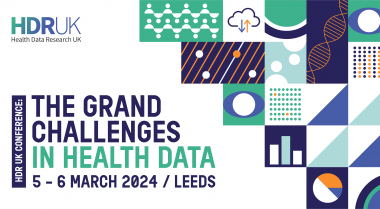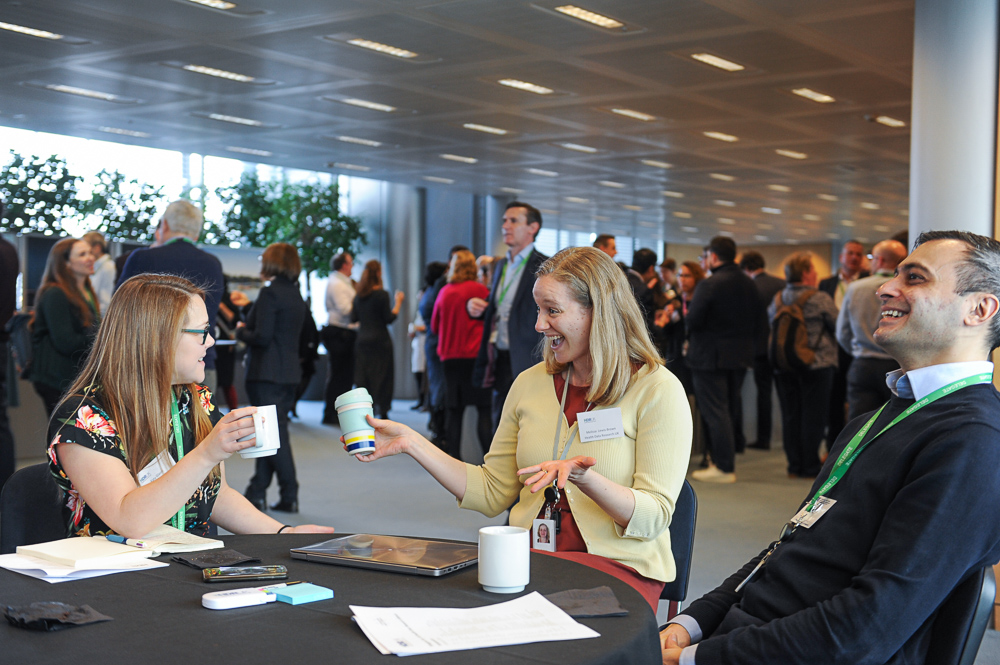Congratulations to our HDR UK Annual Awards shortlisted nominees and Lightning Talk speakers
25 January 2024 | Author: Abbey Hart, Communications and Content Officer
We are delighted to announce the shortlists for our HDR UK Annual Awards - including the recently renamed Susannah Boddie Award for Impact of the Year - and our exciting line-up of conference early career researcher Lightning Talks.
 Each year, HDR UK awards prizes to recognise excellence in health data research. We are also keen to showcase the work of early career researchers from the HDR UK community and have selected six speakers to present a 4-minute Lightning Talk at the conference
Each year, HDR UK awards prizes to recognise excellence in health data research. We are also keen to showcase the work of early career researchers from the HDR UK community and have selected six speakers to present a 4-minute Lightning Talk at the conference
The award shortlists and Lightning Talk speakers were selected by a panel of experts. The award winners and best talk – as voted by the audience – will be announced at the Health Data Research UK Conference 2024: The Grand Challenges in Health Data on 5 March 2024.
Susannah Boddie Award for Impact of the Year
Our ‘Impact of the Year’ award has been renamed to the Susannah Boddie Award for Impact of the Year in honour of Susannah, a 27-year old senior data scientist in 10 Downing Street’s Data Science team (10DS) who passed away in August 2023.

Susannah was an incredible health data scientist, an inspiring sportswoman, a loved and admired colleague and a friend to those at No 10, and many others within the civil service. She rapidly rose to prominence based on her hard work, talent, and leadership abilities. Working closely with colleagues at the Department of Health and Social Care and the NHS, Susannah ensured that the Prime Minister always had the best available data and evidence for important decisions. She was particularly skilled at explaining complex evidence in a way that anyone could understand and relate to. Her dedication and determination, her insight, and her kindness were an example to colleagues across the civil service.
The Susannah Boddie Award for Impact of the Year recognises work that takes an important step towards the mission of uniting health data to enable discoveries that improve people’s lives. We are celebrating work from the last 12 months that has delivered impact to clinical practice or policy through algorithms, software, research publications, and more.
Shortlisted nominees:
- Green Algorithms – This project promotes more environmentally sustainable computational science by building tools for carbon footprint estimation, raising awareness about the environmental impacts of algorithms, and driving change in the computational science community.
- The impact of the COVID-19 pandemic on cardiovascular disease prevention and management – Using data on routinely dispensed prescriptions in England, Scotland and Wales, this study found nearly half a million people missed out on starting medication to lower their blood pressure during the Covid-19 pandemic. This represents the first time that medicines data has been used to follow changes in day-to-day management of chronic conditions.
- Using de-identified primary care data for research in Scotland: A meeting of stakeholders – The in-person meeting facilitated discussions between key stakeholders on the benefits and barriers to using Scottish primary care data in population health research – in a transparent manner.
Public and Patient Involvement and Engagement Award
At HDR UK, we want the views and ideas of patients and the public to be embedded into each stage of research, to ensure public data is used in a way that is transparent and trustworthy to improve lives.
The Patient and Public Involvement and Engagement award celebrates best practice and innovation in public involvement and engagement across all aspects of research, infrastructure and service development.
Shortlisted nominees:
- Co-PACT – This work focuses on addressing ethnic inequalities in mental health care and sharing the stories of people with lived experience of being detained in a mental health hospital, across the mental health system.
- DATAMIND – DATAMIND supports mental health data science by working with patients and people with experience of mental health conditions to improve how the NHS, charities, industry, and researchers use and share data.
- Understanding Patient Data (in collaboration with Thinklusive and the Centre for Ethnic Health Research) – This project involved the co-creation of accessible reading and video materials – ensuring inclusion of the British Sign Language (BSL) community and translators to address language barriers – to help everyone understand that our personal health information is routinely collected, analysed, and can be used for our benefit.
Due to the high-calibre of applicants, the panel will also be giving a letter of commendation to:
- Alleviate Pain Data Hub
- UCLH Data Trust Committee
Team of the Year Award
Team working is core to HDR UK’s mission. The Team of the Year award celebrates collaborative endeavours by groups of researchers, innovators, technologists, triallists and more, that embody HDR UK’s values of transparency, optimism, courage, respect and humility.
Shortlisted nominees:
- Lancashire Teaching Hospitals Data Science Group – Over the past year, the team have done an immense amount of work – harmonising 1.7 million patient records onto the OMOP common data model, records cover the entire care journey of many over the past 15 years, and creating a new vital resource and dataset for researchers.
- Pan-UK Data Governance Steering Group – The steering group includes over 30 members and represents data custodians, policymakers and other key stakeholders (including public and patients) across the four nations of the UK. Their focus is on simplifying and streamlining data access governance processes for health and health-relevant data.
- Peninsula Collaboration for Health Operational Research and Data Science – A longstanding and dedicated group representing the Southwest of England, the team collaborate with health and care teams, including those within NIHR, to drive research and training in the effective use of data within health and care services.
Meet this year’s Lightning Talk speakers
Our Lightning Talk session is back by popular demand and will take place at our conference on 5 March 2024.
This year’s speakers:
- Patrick Bidulka (London School of Hygiene & Tropical Medicine) – Addressing confounding in analyses of comparative effectiveness using electronic health records: a case study in type 2 diabetes using an instrumental variable.
- Claudia Lindner (University of Manchester) – Using AI to enhance efficiency and equality of hip surveillance in children with cerebral palsy.
- Hayley Lowther-Payne (Lancaster University) – Understanding access to NHS adult mental health services for sexual minority groups in North West England: an exploratory study using routinely collected data.
- Matthew Watson (Durham University) – From Prediction to Practice: Addressing Bias and Data Shift in Machine Learning Models for Chemotherapy-Induced Organ Dysfunction.
- Georgina Ireland (UCL) – Linking administrative data from hospitals and family courts for England to estimate cumulative incidence of involvement in public law family court proceedings and inform healthcare intervention.
- Erum Masood (University of Dundee) – Mapping Scottish Population Scale COVID-19 and relevant clinical data Health Data to Observational Medical Outcomes Partnership (OMOP) Common Data Model (CDM).



